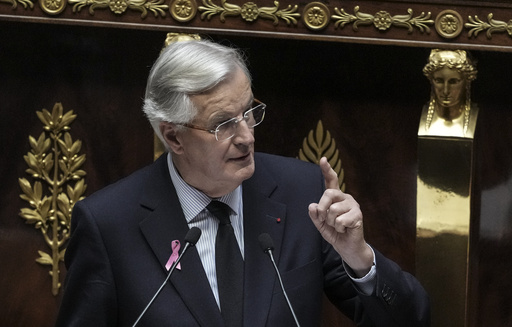
PARIS — The new government in France has introduced its 2025 budget proposal, which includes significant tax increases and spending cuts designed to address the country’s substantial deficit.
Prime Minister Michel Barnier characterized the extensive fiscal shortfall as a “sword of Damocles” that threatens to push the euro zone’s second-largest economy “to the edge of the precipice.” This budget plan has elicited strong reactions from citizens and is expected to provoke intense discussions in parliament in the weeks ahead, as the government’s stability hangs in the balance.
Why has France found itself in such a dire financial situation?
France has a high rate of public expenditure largely driven by generous social welfare systems, healthcare, and education, coupled with a tax framework that fails to fully cover these expenses. For more than twenty years, the nation has endeavored to maintain its deficit below the EU’s 3% of GDP target.
The country’s debt saw a notable rise, largely due to the economic downturn triggered by the COVID-19 pandemic. In response, President Emmanuel Macron implemented an expansive state intervention strategy aimed at preserving jobs and supporting businesses, which included a vast partial unemployment initiative and subsidized leave for childcare.
As the nation emerged from the pandemic, Macron’s previous centrist administration pledged to restore fiscal order. However, budget overspending and disappointing tax returns have deepened the deficit, which is projected to hit 6.1% of GDP this year.
Barnier, who took office in September after unexpected elections, has committed to reducing this figure to 5% by the following year.
Why is this issue significant?
France is facing mounting pressure from the European Union’s executive arm to rein in its debt levels. Earlier this year, the EU initiated a formal procedure against France for its excessive debt, marking the start of a lengthy process before any potential measures can be enforced to compel corrective actions.
Barnier has opted to postpone the deadline for achieving the euro zone’s 3% deficit target from 2027 to 2029.
This situation has also complicated France’s standing within financial markets, leading to increased borrowing costs.
François Villeroy de Galhau, the governor of the Bank of France, remarked that France resembles “a family living beyond its means,” emphasizing that it must cut its expenses and boost its income. “Our spending needs to be managed—when compared with our European peers, we share similar social models but at a significantly higher cost,” he stated.
“An effort from nearly everyone is essential,” Villeroy de Galhau added.
What strategies has Barnier proposed to remedy the situation?
The Barnier administration has proposed a budgetary contraction of €60 billion ($65 billion) for the upcoming year, which would involve increasing taxes—a potentially controversial maneuver in a nation already known for high taxation.
Plans include introducing new taxes—characterized as temporary—on approximately 24,000 of the wealthiest households and on the profits of numerous large firms operating in France. Additionally, the proposed budget outlines increased taxes on electricity, air travel, and vehicles that produce emissions.
The government also aims to identify opportunities for budget reductions, including a six-month freeze on state pensions next year and reduced funding for apprenticeship programs and subsidized job contracts.
Spending within France’s robust social security infrastructure may also experience cuts through initiatives such as decreased medical reimbursement rates and sick leave provisions.
Nevertheless, the defense budget, which expanded significantly following the conflict in Ukraine, is expected to remain intact.
Who would be most impacted by these proposed reductions?
The “austerity budget” has drawn criticism from left-wing opposition politicians and labor unions, who assert that it may adversely impact millions of low-income families, apprentices, retirees, and small enterprises. Eric Coquerel, a left-wing lawmaker and head of the National Assembly’s Finance Committee, stated, “The reductions to public spending and social safety nets disproportionately affect working-class and middle-class citizens.”
The far-left labor organization CGT voiced that “once again, employees and pensioners are being asked to bear the financial burden.”
More moderate left-leaning groups like the CFDT have also called out Barnier’s proposals, warning of “significant deterioration in essential public services,” notably in education and healthcare.
Business organizations have similarly cautioned against potential job losses stemming from tax increases, as the Confederation of Small and Medium Size Firms (CPME) noted that the government’s initiatives “will lead to a sharp escalation in costs for companies.”
Is this budget a pivotal issue for the government?
The budget will undergo rigorous examination in the National Assembly, where the ruling coalition lacks a decisive majority.
The assembly currently comprises three dominant factions: the leftist New Popular Front, the far-right National Rally party, and Macron’s centrist allies who have allied with conservatives to govern effectively.
Barnier’s budget approach has sparked backlash, even among centrists within his coalition, who argue that reducing taxes is essential for maintaining France’s competitive edge.
Left-leaning lawmakers are anticipated to propose amendments to the budget, while some far-right members have decried plans that may lead to substantial compromises for lower and middle-income citizens.
With its very existence on the line, the government might need to retract some of its planned measures, as losing a budget vote could escalate into a severe political crisis.
Barnier may have to depend on the cooperation of far-right members to avoid potential removal via a no-confidence vote.
Alternatively, the government can explore the use of a unique constitutional power to implement the budget without parliamentary approval, though this could provoke its own no-confidence challenges with unpredictable outcomes.
The budget must receive approval before the end of the year.
Recently, Fitch Ratings downgraded France’s outlook from “stable” to “negative,” suggesting that “political fragmentation and a minority government complicate France’s capability to enforce sustainable fiscal policies.”
